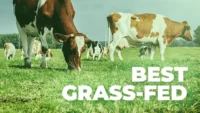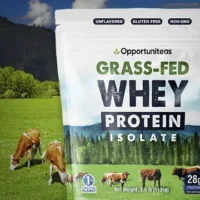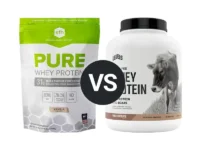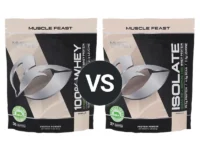Knowledge BaseYou're Questions Answered
Should protein powder be grass-fed?
Grass-fed protein powder refers to whey protein sourced from cows that have been pasture-raised and fed a natural grass diet. This distinction is often seen as a marker of quality, with several potential benefits associated with grass-fed protein over conventional whey protein derived from grain-fed cows. However, whether protein powder "should" be grass-fed depends on individual preferences, dietary goals, and budget considerations. Below, we explore the potential advantages and considerations of grass-fed protein powder.
Benefits of Grass-Fed Protein Powder
- Higher Nutrient Profile
Grass-fed whey protein has been shown to have a more favorable nutrient profile compared to conventional whey. Specifically, grass-fed protein often contains higher levels of healthy fats like omega-3 fatty acids and conjugated linoleic acid (CLA). These fats are beneficial for heart health and may have anti-inflammatory properties. CLA, in particular, is linked to improved body composition and fat loss, which can be an added benefit for individuals focused on weight management or muscle-building goals. - Fewer Additives and Hormones
Grass-fed cows are typically raised without the use of synthetic hormones, antibiotics, or genetically modified organisms (GMOs), which may be present in protein from grain-fed cows. This makes grass-fed protein an attractive option for individuals looking to avoid these substances in their diet. The cleaner production methods can contribute to overall health and well-being. - Better for the Environment
Raising cows on grass is considered more sustainable and environmentally friendly than conventional grain-feeding practices. Grass-fed cows are typically allowed to graze freely, reducing the environmental impact of intensive farming methods used in grain-fed systems. For the eco-conscious, choosing grass-fed protein powder may align better with personal values regarding animal welfare and environmental sustainability. - Improved Taste and Purity
Many users report that grass-fed protein powders have a cleaner, more natural taste compared to conventional whey protein. Additionally, grass-fed whey is often less processed, which helps retain more of its natural flavor and nutrients. This can make it a more pleasant option for those who are sensitive to artificial flavors or additives commonly found in lower-quality protein powders.
Considerations for Grass-Fed Protein Powder
- Higher Cost
One of the primary drawbacks of grass-fed protein is its higher price point. The cost of raising grass-fed cows is typically higher than conventional farming practices, and this is reflected in the price of grass-fed protein powder. For individuals on a budget, this could be a limiting factor, as conventional whey protein may offer a more affordable alternative. - Not Always Necessary for All Goals
While grass-fed protein powder offers several benefits, these may not be essential for everyone. For individuals who are primarily concerned with meeting their protein needs for muscle growth and recovery, conventional whey protein can still be an effective and affordable option. The higher nutrient content of grass-fed protein may not be a priority for those who are already obtaining healthy fats like omega-3s and CLA from other sources in their diet. - Availability
Grass-fed protein powders may not be as widely available as conventional whey protein. Depending on location and product availability, it may be harder to consistently find high-quality grass-fed protein. For those who prioritize convenience, conventional protein powders might be a more accessible option.
Choosing grass-fed protein powder offers several advantages, including a higher nutrient profile, fewer additives, and a more environmentally friendly production process. For those seeking a cleaner, more natural source of protein, grass-fed whey can be a great option, especially if budget and availability are not significant concerns. However, for those primarily focused on meeting protein needs for fitness or weight loss goals, conventional whey protein may still be a cost-effective and convenient alternative. Ultimately, whether you should choose grass-fed protein depends on your individual priorities, dietary goals, and budget.
For more information, you can check out our best-reviewed grass-fed protein powders.
Related Questions
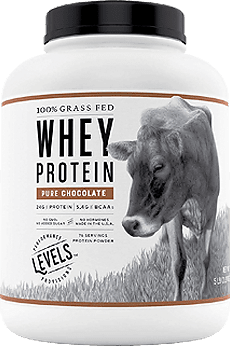
Your Answer
We are a participant in the Amazon Services LLC Associates Program, an affiliate advertising program designed to provide a means for us to earn fees by linking to Amazon.com and affiliated sites.
